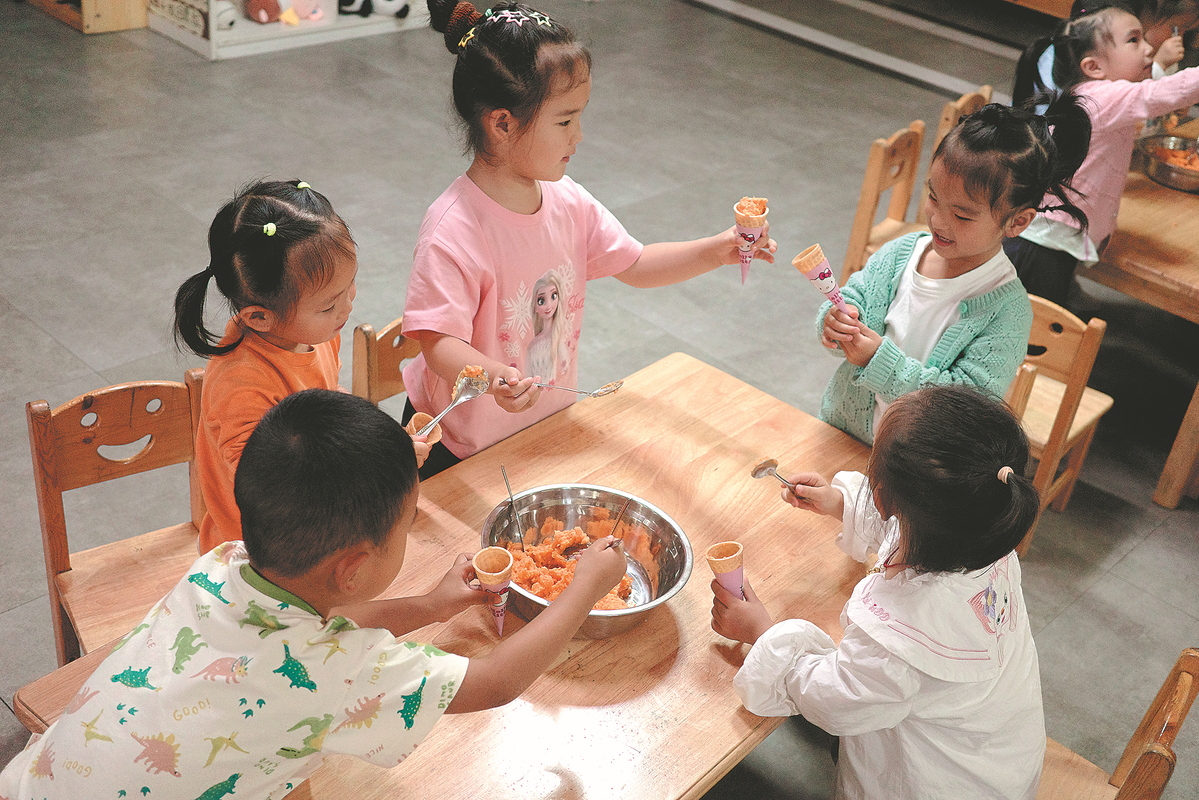
Children make snacks in Qicai Kindergarten in Xiangxi Tujia and Miao autonomous prefecture, Hunan province, on June 26. LIN JIANJIE/XINHUA
CHANGSHA, Oct. 9, 2024 -- Scooping mashed sweet potato into a crispy cone and sprinkling diced melon as toppings, children in Qicai Kindergarten make sweet potato "ice cream", paired with bottled milk for a nutritious afternoon snack.
This kindergarten in Hunan province is a pioneer in providing nutritious meals to rural preschoolers, supported by subsidies and menus from a pilot nutrition program initiated by the UN World Food Programme.
"Over 80 percent of our kids are 'left-behind' children raised by their grandparents as their parents are working in cities," said principal Xiang Haiyan. "The elderly guardians often lack nutritional knowledge. That's where kindergartens can play a role."
Since 2018, the WFP has teamed up with the provincial government to carry out a preschool nutrition improvement program in the mountainous Xiangxi Tujia and Miao autonomous prefecture, providing nutritious school meals, promoting health awareness, upgrading kitchen facilities and sourcing food from local farmers.
The second phase of the program, focused on building a sustainable support system for preschool children, ended last month, having assisted 4,365 children in 27 kindergartens, according to a recent review.
The evaluation shows that the children's overall nutrition improved with the intervention, with the prevalence of stunting, in particular, declining from 8.5 percent to 2.8 percent.
The program provided a subsidy of 4 yuan (57 cents) per child per day and required the kindergartens to provide breakfast, lunch and afternoon snacks, with no fewer than 25 kinds of food served every week based on the dietary guidance.
Teachers and students in preschool education at the Xiangxi-based Normal College of Jishou University helped develop the menus incorporating seasonal local ingredients.
"In the later stage of the program, teachers from many kindergartens started developing menus by themselves and we provided feedback," said Wu Feng'e, a lecturer at the university, noting that preschool teachers in the program now have a deeper understanding of what a balanced diet looks like.
Meanwhile, the program linked school meals with local agricultural production.
During the second phase of the program, 157 smallholder farmers supplied food, helping generate more than 1.43 million yuan of income.
For three years, Li Hongnian has supplied food to Shaping Kindergarten, where his two grandchildren attend. The 68-year-old farmer said that under the program he was provided with organic fertilizer and seeds each semester.
"I've been a farmer my whole life. I'm glad to see my grandchildren grow healthier and stronger by eating what I've planted with my own hands," Li said.
WFP China representative Zhao Bing said, "Nutritious meals are not just food on the plate, but also an investment in the future generation.
He added that the WFP will share the practical experience gained from the program with other countries.
Xinhua


